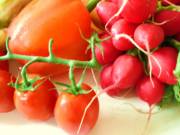Best Diet Tips for Relieving Constipation & Stimulating Bowel Movement
The link between constipation and diet is well-established. Certain dietary habits are known to cause constipation and irregular bowel movement, while others can help relieve constipation and stimulate regular bowel movement. In this section of healwithfood.org's Anti-Constipation Guide, you will learn the best diet tips for relieving and preventing constipation.
Important notice: The information below and elsewhere on this website is not intended or implied to be a substitute for professional medical or health advice. Always seek the advice of a qualified health care professional.
#1: Ensure a Sufficient Daily Fiber Intake
Dietary fiber, sometimes called roughage, is the part of plant-based foods that your body's enzymes cannot digest. It is therefore not absorbed into the bloodstream and cannot be used for energy. Dietary fiber is commonly classified into two main categories: soluble and insoluble fiber.
When mixed with water, soluble fiber absorbs the liquid and forms a soft, gel-like substance. Although this gel slows down digestion, it can help prevent and relieve constipation due to its ability to make stools bulkier and softer. Insoluble fiber does not dissolve in water, and it goes through the intestinal tract relatively fast and passes the bowel largely intact. However, it does add bulk to your stools and can therefore help keep things moving. Thus, both soluble and insoluble fiber can help relieve constipation and stimulate healthy bowel movement.
In order to avoid bloating and gas, it is best to add fiber to your anti-constipation diet gradually. Some of the best sources of soluble fiber include oatmeal, berries, flaxseed, apples, carrots, peas, lentils, beans, and psyllium. Good sources of insoluble fiber include brown rice, whole grains, wheat bran, nuts, and many vegetables.
#2: Drink Plenty of Water
If you include a lot of fiber-rich foods in your diet in order to avoid constipation, make sure you drink plenty of water. If you do not drink enough water, dietary fiber may act as a cause rather than a cure for constipation. When following an anti-constipation diet, it is also advisable to avoid alcohol, coffee, and tea as these substances have a dehydrating effect on the body.

#3: Consume Foods Rich in Magnesium
There is some evidence suggesting that a low magnesium intake may cause constipation in some people. Dietary intake of magnesium has decreased significantly in most Western countries over the last century. This is largely due to the popularity processed and refined foods have gained in the West (refining and processing removes magnesium from foods). Also the intensive farming practices employed in many Western countries deplete the soil of magnesium.
More on Constipation & Diet:
For more diet-related information on how to prevent and relieve constipation, be sure to check out the list of the 10+ best foods for preventing constipation as well as our collection of constipation fighting recipes featuring some of the best anti-constipation foods.

